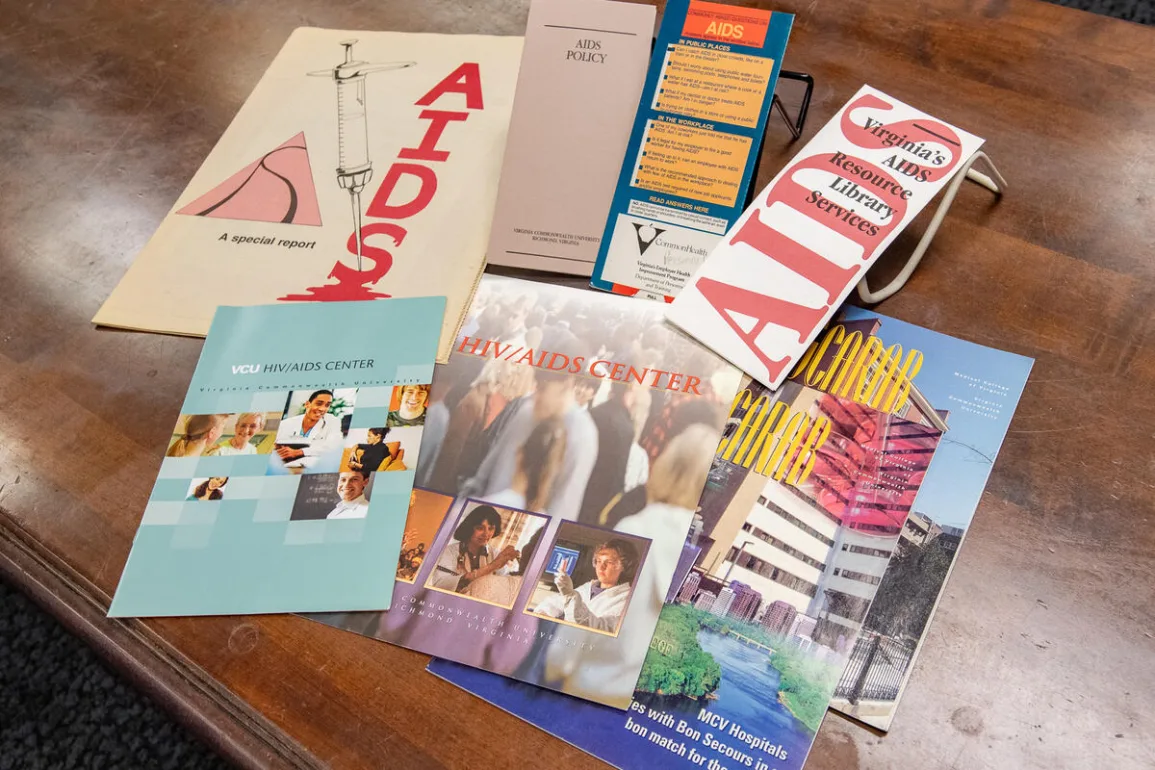AIDS deaths and HIV infection rates no longer dominate the headlines – medical advances in the past 40 years have dramatically improved the landscape for patients.
But in 2022, about 39 million people worldwide were living with the virus, and more than 1 million new infections were reported that year, according to KFF. As HIV/AIDS continues to strongly impact lives and our health care system, Virginia Commonwealth University’s Health Sciences Library is spotlighting opportunities to reflect on the crisis.
They include two exhibits – on loan from The Valentine in Richmond and from the National Library of Medicine – as well as a documentary screening and a virtual experience with the AIDS Memorial Quilt. A companion display from VCU Libraries’ Special Collections and Archives will showcase artifacts of Richmond’s public health crisis of the 1980s and ’90s. The programming will be at the VCU Health Sciences Library through Dec. 1 – World AIDS Day – and beyond.
“We hope, through dynamic programming and related exhibits, we can encourage reflection, discovery and awareness of how HIV/AIDS impacted the lives of many,” said Emily Hurst, the Health Sciences Library deputy director and Research and Education Department head who organized the exhibits. “We hope that the display and related exhibits will serve as an important reminder about the many lives lost to HIV/AIDS as well as the work of dedicated health care professionals.”
One such professional at VCU is Dan Nixon, D.O., Ph.D. The longtime medical director (2005-23) of VCU Health’s HIV/AIDS Clinic has worked for 30 years in infectious disease, with a focus on AIDS/HIV, and the MCV Campus has played a pivotal role in providing compassionate care for patients. Established in 1986, the clinic is believed to be the largest health center of its kind in Virginia.
“We could not control the virus,” Nixon, who joined the clinic in 1993, said of the early years fighting HIV/AIDS. “I liken it to oncology before decent chemotherapy drugs. With the exception of a few individuals, it was a death sentence.”
By the mid-1990s, new drugs and combinations became “a game-changer,” Nixon said. For patients, “there was hope for the first time that they could survive this and potentially live a normal life expectancy” – as shown by the millions who now live with HIV/AIDS.
For students and visitors, the Health Sciences Library exhibits offer the chance to learn about the early stages of the crisis and reflect on the political activism, stigma and community responses that emerged and co-existed while the medical community sought lifesaving treatments.
HIV/AIDS exhibits and activities
- “Voices from Richmond’s Hidden Epidemic,” an exhibit from The Valentine
Oct. 31 – Jan. 8, 2024 / Health Sciences Library gallery, 509 N. 12th St.
Despite considerable advancements in medicine and social awareness, misconceptions endure today. HIV/AIDS is perceived by many as a relic of the past, characterized by modern treatment options and primarily affecting homosexual white males. Yet gay Black males face staggering 1-in-2 odds of contracting HIV/AIDS, and the prevalence of infection within Richmond’s Black community is compounded by factors including poverty, the elimination of sex ed programs in public schools and the ongoing opioid crisis. Told through the voices of survivors, caregivers, activists and health care professionals, this project, which was displayed at The Valentine in 2021, offers a distinct perspective on the epidemic in Richmond. The exhibit features photography by Michael Simon, with oral histories recorded by Laura Browder and Patricia Herrera. VCU Health is among sponsors of this exhibit.
- “Surviving and Thriving: AIDS, Politics and Culture,” an exhibit from the National Library of Medicine
Nov. 13 – Dec. 16 / Health Sciences Library Special Collections and Archives reading room
This traveling exhibit focuses on the AIDS epidemic’s emergence in the United States in the 1980s. As the disease spread, so did fear and confusion. The infectious “rare cancer” bewildered researchers and bred suspicion. Many feared contact with those who were ill. This exhibit explores human stories in the ever-changing relationship between science and society.
- “The AIDS Experience: Stories of Resilience,” artifacts from VCU Libraries’ Special Collections and Archives
Nov. 13 – Jan. 26, 2024 / Health Sciences Library Special Collections and Archives reading room
This companion exhibit showcases materials documenting the Richmond AIDS experience. Two cases will feature materials tied to the two themes of the national exhibit. The “Thriving” case will focus on society/culture and include photographs, posters and publications from collections held by VCU Libraries, such as records of the Richmond Triangle Players and the Fan Free Clinic, that will highlight AIDS awareness and community activism and support in Richmond. The “Surviving” case will focus on the medical and practitioner side of the crisis, including correspondence, newsletters, reports from nursing organizations and other documents and artifacts.
- World AIDS Day: Explore the AIDS Quilt and Red Ribbon Giveaway
Nov. 27 – Dec. 1 / Health Sciences Library lobby
The National AIDS Memorial, in collaboration with the AIDS Quilt Touch team, has created an interactive platform that features all panels of the AIDS Memorial Quilt. The first were stitched together in the late 1980s, and now there are more than 50,000 panels with 105,000 names sewn into its fabric. This digital initiative lets patrons anywhere engage with the quilt and see the expressions of love and the personal narratives woven into each panel. Patrons can search for the names of friends or loved ones who may be commemorated in the quilt, and they can spread AIDS awareness by picking up a free red ribbon as a show of support.
- RealLife Film Series: “The Last One: Unfolding the AIDS Memorial Quilt”
Nov. 30 (12:15 – 1:45 p.m.) / Health Sciences Library Special Collections and Archives reading room
This documentary presents an account of the AIDS epidemic in the United States, with a focal point on the AIDS Memorial Quilt. In the 1980s, as AIDS ravaged the gay community, the quilt project emerged to name and grieve those lost and promote understanding and medical advancement. The film explores the evolution of a public health crisis, initially stigmatized as a “gay disease,” as it transitioned to disproportionately affect African Americans, women and youth. The film will be paired with a discussion of its themes and how they relate to current research at VCU and in the community, as well as to topics in the “Surviving and Thriving” exhibit. This event is free and open to the public. Registration is encouraged but not required; snacks and drinks will be provided.
Subscribe to VCU News
Subscribe to VCU News at newsletter.vcu.edu and receive a selection of stories, videos, photos, news clips and event listings in your inbox.



